Getting rid of flies around your trash can doesn’t have to be a daunting task, flyermedia.net offers you practical and effective solutions to tackle this common nuisance. By understanding why flies are attracted to your trash and implementing simple yet powerful methods, you can maintain a fly-free environment while also contributing to a cleaner, more sustainable planet. Explore pest control strategies, effective waste management, and discover eco-friendly practices that will make your surroundings more pleasant.
1. Why Are Flies Attracted to Your Trash Can?
Flies are drawn to trash cans because they provide an ideal breeding ground. But what exactly makes your garbage bin so appealing to these persistent pests?
Female flies can lay hundreds of eggs, which can hatch into flies within days. According to research from Penn State Extension, an adequate food source can quickly turn a few eggs into millions of flies. Decaying matter in garbage cans is a prime example of such a food source. Different species of flies are attracted to various things, but house flies, black soldier flies, and fruit flies are commonly found feasting on food waste. These flies are often attracted to decaying organic matter and the yeast cells that grow on sugary substances and rotting fruits. Keeping organic matter out of your trash can is a crucial step in getting rid of flies.
 Green bin containing decaying produce
Green bin containing decaying produce
An assortment of decaying fruits and vegetables is providing a delicious, fermenting feast for flies around your trash can.
2. How Can You Get Rid of Flies Around Garbage Cans?
Discovering a swarm of flies around your trash bin requires immediate action to prevent further infestation. But what are the most effective methods to eliminate these unwelcome guests?
Here are eight easy methods to get rid of flies around your garbage cans:
2.1 Clean Your Trash Can and Eliminate Odors
Flies are attracted to the odors of rotting meat and produce, so cleaning your trash can is essential. How can you effectively clean your trash can and neutralize these odors?
Cleaning trash cans is simple and utilizes common household products. Fill a spray bottle with a mixture of tap water and white vinegar. Let the solution sit for 15-20 minutes, then scrub everything thoroughly, including the lid. Once dry, sprinkle a cup or two of baking soda inside the bin and let it sit overnight to neutralize odors and repel flies. Adding baking soda each time you empty the trash and using dryer sheets or charcoal can further prevent odors.
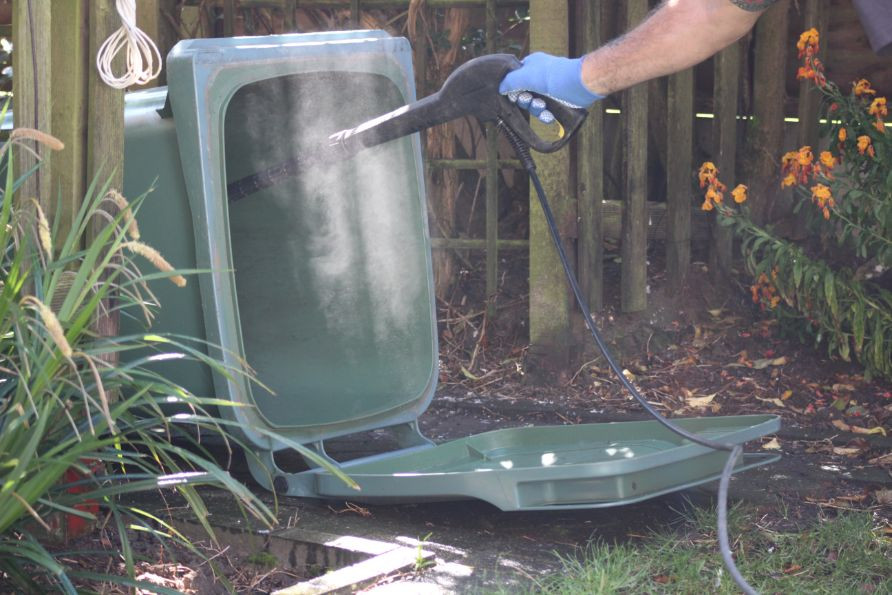 Cleaning trash can
Cleaning trash can
Spray, scrub, and sanitize your trash can to eradicate the stinky smells that attract flies.
2.2 Blow Flies Away with a Fan
Using a fan can deter flies from your trash area. But how effective is this method, and where should you place the fan?
A box fan placed near your trash bins can blow flies away. Flies struggle to fly in strong winds, making strategically placed fans highly effective. Additionally, the cool air can make taking out the trash more pleasant during the summer. Cool air from a fan or AC can deter various bugs and rodents, including mosquitoes, wasps, and even mice.
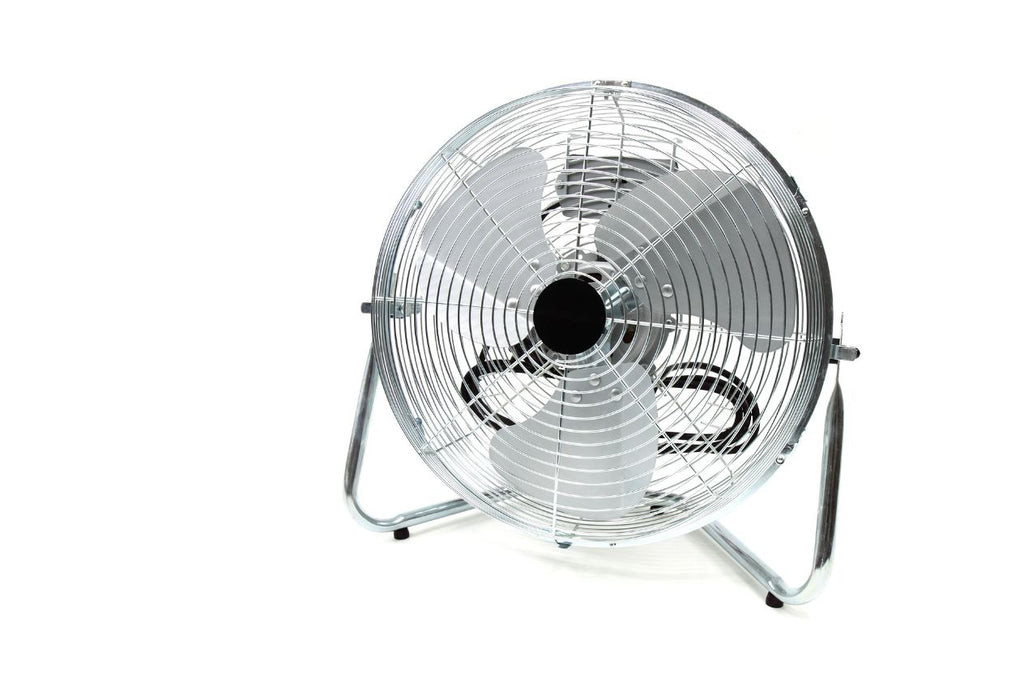 Silver fan against a white background
Silver fan against a white background
A simple electric fan can create a wind barrier between the trash and the flies, halting their feasting.
2.3 Utilize Ginger Spray
Ginger’s spicy scent can repel flies. But how do you create an effective ginger spray and where should you apply it?
Flies dislike the smell of ginger, so a spray containing ginger powder can work wonders. Diluted ginger spray can be sprayed directly at swarms of flies or liberally on and around the garbage bin. The strong scent will deter flies and prevent them from gathering around your trash.
 Ginger root with assorted spices
Ginger root with assorted spices
The distinct, spicy smell of ginger can serve as an effective fly repellent around your garbage.
2.4 Make an Eco-Friendly Homemade Fly Killer
Creating a homemade fly killer can be a safe and effective solution. What are the best ingredients to use for a non-toxic fly killer?
You can create a non-toxic homemade fly killer spray using essential oils. Flies dislike certain essential oils, especially lemongrass. Add ten drops of lemongrass essential oil to a spray bottle with 2 oz of hot water, shake, and spray directly on the flies around your trash bin. Another method involves a bowl of water, apple cider vinegar, and a drop of dish soap. The sweet smell of apple cider vinegar attracts flies, while the soap breaks the surface tension, causing them to drown.
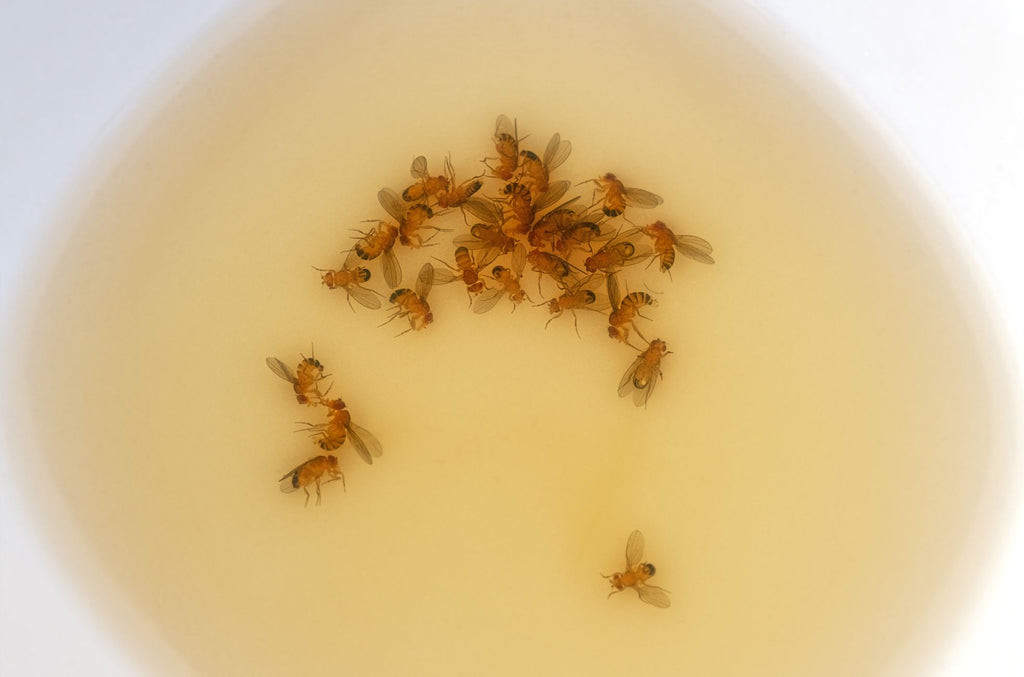 Dead flies in a liquid
Dead flies in a liquid
A bowl of water, apple cider vinegar, and dish soap makes a deadly yet environmentally conscious fly trap.
2.5 Apply Chemical Bug Spray
Chemical bug sprays can quickly eliminate flies. But what ingredients should you look for, and how should you use them safely?
For extreme measures, bug sprays containing active ingredients like permethrin can eliminate flies. However, be cautious as permethrin is not ideal for inhalation. If bug spray is unavailable, household chemicals like Windex or hairspray may also work. Always use these chemicals carefully to avoid any health hazards.
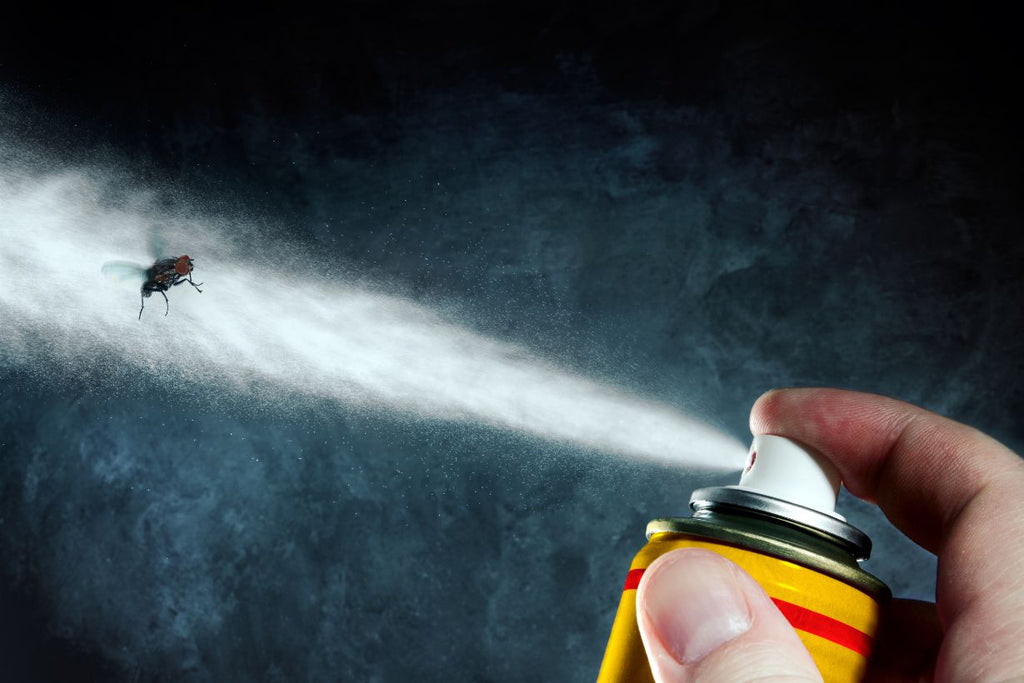 A person spraying a bug
A person spraying a bug
If a fly infestation is severe, a bug spray will target the pests.
2.6 Hang Fly Traps
Fly traps are a classic method for catching flies. But how do they work, and what types of fly traps are most effective?
Fly traps are adhesive strips coated with a sweet, fragrant substance to lure flies. Once flies land on the sticky flypaper, they become trapped and eventually die. For a faster solution, consider using flypaper coated with poison. This method can be a more humane way to get rid of flies around garbage cans.
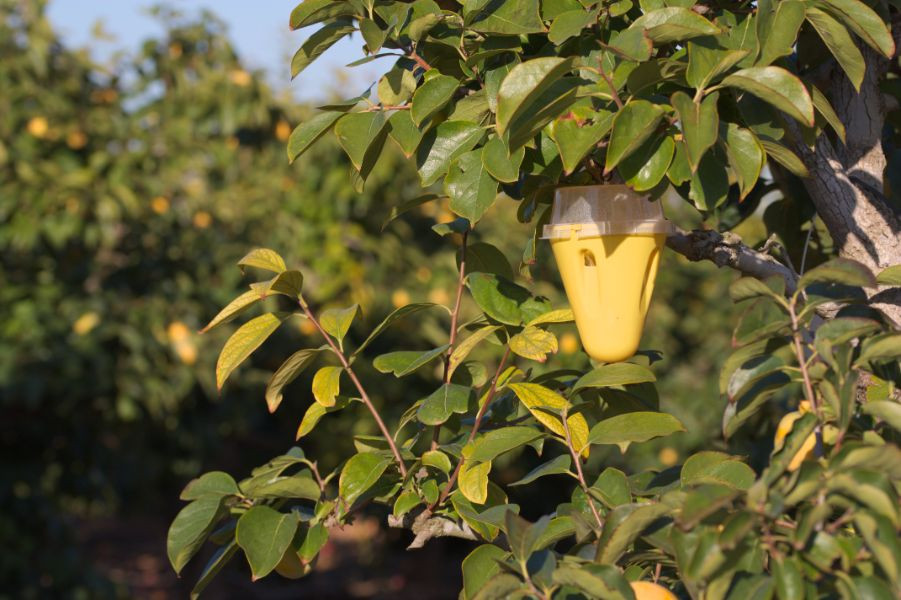 Fly trap hanging from a tree
Fly trap hanging from a tree
Hanging fly traps are a passive and easy way to trap and eliminate flies.
2.7 Install a Garbage Guard
Garbage guards release insecticide vapor to kill insects. But how do they work, and are they safe for all environments?
Garbage guards use slow-release technology to emit an odorless vapor of insecticide, killing insects like flies and fruit flies. These guards provide long-lasting pest control, releasing vapor for up to four months. Easy to install with an adhesive backing, they attach directly to the trash can lid. Ensure the lid is closed to maximize effectiveness. Garbage guards are designed for outdoor use and are not recommended for indoor trash cans.
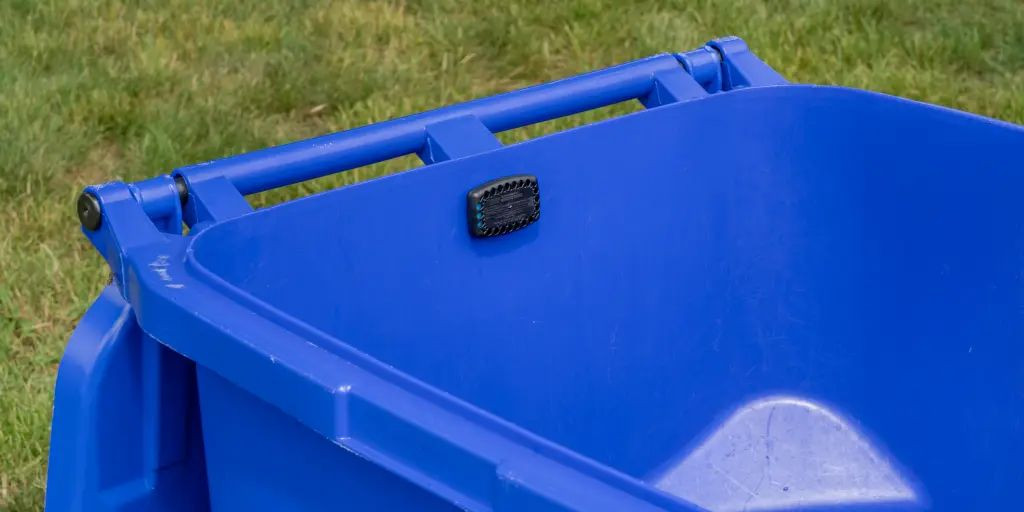 A garbage guard on a blue bin
A garbage guard on a blue bin
A garbage guard utilizes slow-release insecticide vapor to keep flies away from your trash.
2.8 Seek Professional Pest Control
When infestations are severe, professional help may be necessary. What services do exterminators offer, and how can they provide a permanent solution?
If fly problems are out of hand, an exterminator or pest control expert can provide a more permanent solution. Many offer same-day services for fly removal and may use eco-friendly measures. While chemicals like controlled-release insecticides are available for purchase, they should only be used by licensed pest management professionals due to their commercial grade and potential dangers if used improperly.
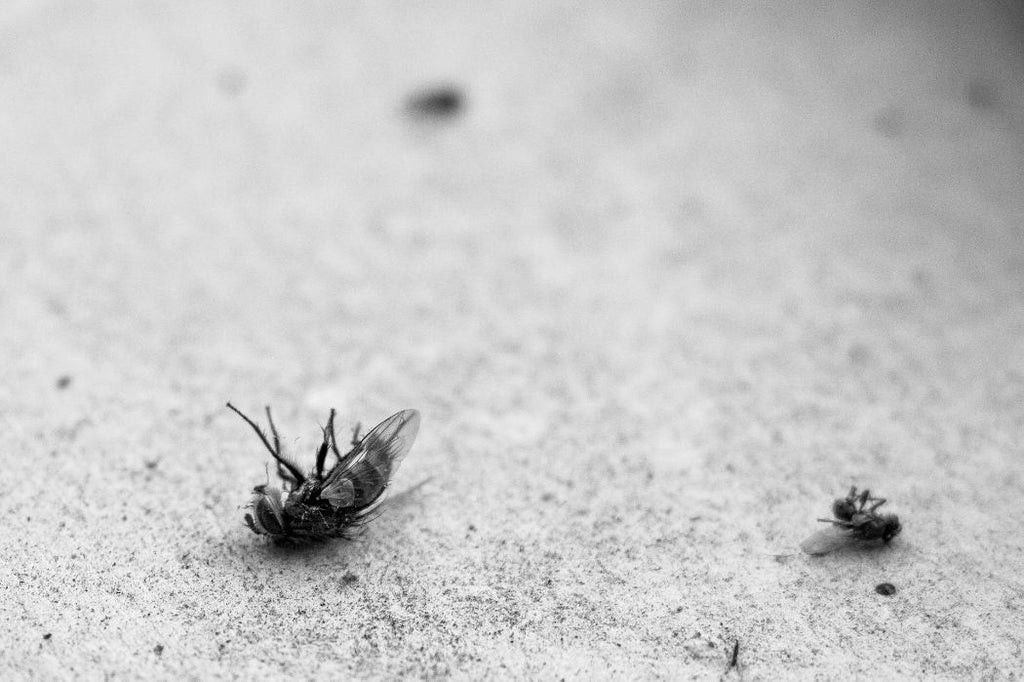 Greyscale photo of two dead flies
Greyscale photo of two dead flies
An exterminator or pest control expert can provide a more permanent solution to extreme infestations.
3. What Are Some Proactive Tips for Preventing Flies Around Garbage Bins?
Preventing flies from infesting your trash area is crucial. But what proactive measures can you take to make your trash bins less attractive to these pests?
Here are nine tips for preventing flies around garbage bins:
- Don’t put food waste in the garbage: The best way to deter flies is to eliminate their food source. Dispose of meat, fruit, and vegetable scraps in an electric kitchen composter instead of the trash.
- Tie up the garbage properly: Secure garbage bags to prevent flies from smelling and accessing rotting food. Double-bagging may be necessary for extra protection.
- Use biodegradable trash bags: Plastic bags trap moisture, creating favorable conditions for flies. Biodegradable bags are more porous, helping waste dry out quickly.
- Line the bin with newspapers: Newspapers at the bottom of the bin soak up moisture, keeping the garbage drier and easier to clean.
- Try cinnamon oil fly deterrents: A spray containing cinnamon essential oils and water smells pleasant to humans but deters flies.
- Control flies with clove oil: Essential oils like clove can be sprayed in areas that attract flies or directly on the flies as an insecticide.
- Thyme oil can repel flies too: Spray essential oils containing thyme on and around your trash to deter flies with its strong scent.
- Deter flies with basil leaves: Steep basil leaves in boiling water overnight, then combine the resulting oil with vodka and spray on areas that attract flies.
 Trash bag on floor next to slippers
Trash bag on floor next to slippers
Ensure you’re tying up the garbage properly to eliminate odors leaking out to pests.
4. Preventing Flies for Good: Can Lomi Help with Food Waste Disposal?
Using Lomi can revolutionize how you handle food waste. How does Lomi work, and what are the benefits of using it over traditional methods?
A garbage disposal isn’t always ideal for food scraps, as it can lead to clogs, plumbing issues, or unsustainable waste incineration. Throwing organic waste in the trash is also problematic. One of the best solutions is to transform food waste into nutrient-rich dirt using a connected food recycler like Lomi.
Lomi is a no-fuss way to sustainably transform food scraps into something useful for our planet. Landfills are one of the worst places for food to end up, contributing to methane emissions, resource waste, bad odors, and harm to wildlife. Lomi is a highly-rated way to process kitchen scraps and an eco-friendly alternative to the landfill.
 Tattooed arm lifting lid of lomi electric kitchen composter
Tattooed arm lifting lid of lomi electric kitchen composter
Lomi is an electric kitchen composter that turns your food scraps into nutrient-rich dirt.
5. How Does Lomi Work to Reduce Fly Infestations?
Flies are attracted to the decaying food in your trash, but how can you prevent this attraction?
Lomi tackles this problem head-on by transforming food waste into compost material. By reducing the amount of food scraps in your trash, you eliminate the primary attractant for flies. Here’s how Lomi makes a difference:
- Reduces Food Waste Volume: Lomi significantly reduces the volume of food waste, making it less appealing to flies.
- Eliminates Odors: Lomi’s composting process minimizes the odors that attract flies to your garbage.
- Creates Usable Compost: Instead of ending up in landfills, your food waste becomes nutrient-rich compost for your garden.
6. What Are the Environmental Benefits of Using Lomi?
Choosing Lomi offers significant environmental advantages. How does it contribute to a more sustainable lifestyle?
Landfills are major contributors to environmental problems, including methane emissions and soil contamination. According to research from the Environmental Protection Agency (EPA), landfills are the third-largest source of human-related methane emissions in the United States. By diverting food waste from landfills, Lomi helps to:
- Reduce Methane Emissions: Food waste in landfills decomposes anaerobically, producing methane, a potent greenhouse gas. Lomi’s aerobic composting process significantly reduces methane production.
- Conserve Resources: Lomi transforms food waste into valuable compost, reducing the need for synthetic fertilizers and conserving natural resources.
- Minimize Pollution: By minimizing the amount of waste sent to landfills, Lomi helps reduce soil and water pollution.
7. How Can You Integrate Lomi Into Your Daily Routine?
Integrating Lomi into your daily routine is simple and effective. What are the steps involved, and how does it fit into a busy lifestyle?
Using Lomi is easy and fits seamlessly into any lifestyle:
- Collect Food Scraps: Place all your food scraps into the Lomi device.
- Run the Cycle: Start the Lomi cycle with the press of a button.
- Retrieve Compost: In a few hours, you’ll have nutrient-rich compost ready for your garden or plants.
Lomi is designed to be user-friendly, with minimal maintenance required. Its compact design makes it suitable for any kitchen, and its quiet operation ensures it won’t disrupt your daily activities.
8. Why Choose Flyermedia.net for More Information?
Flyermedia.net is your go-to resource for everything related to aviation and sustainable living. But what makes this website a valuable resource for those interested in more information?
Flyermedia.net offers a wealth of information on various topics, including:
- Aviation News: Stay updated with the latest news, trends, and innovations in the aviation industry.
- Pilot Training: Find resources and guidance on becoming a pilot, including information on flight schools and training programs.
- Sustainable Living: Discover eco-friendly practices and solutions for a more sustainable lifestyle, including waste management and composting.
Flyermedia.net provides accurate, up-to-date information to help you make informed decisions about your interests and lifestyle.
9. What Are the Next Steps to Take Control of Flies Around My Home?
Taking control of flies around your home involves several steps. What actions can you take to start addressing this problem effectively?
Here’s a simple action plan to help you tackle fly infestations:
- Assess the Situation: Identify the sources of attraction for flies around your home.
- Implement Immediate Solutions: Clean trash cans, use fly traps, and apply natural repellents like ginger or lemongrass spray.
- Prevent Future Infestations: Secure garbage bags, use biodegradable liners, and consider investing in a Lomi to manage food waste effectively.
- Stay Informed: Visit flyermedia.net for more tips and insights on sustainable living and aviation.
By taking these steps, you can create a cleaner, more pleasant environment free from the nuisance of flies.
Don’t let flies take over your space. Visit flyermedia.net today to learn more about effective waste management and explore opportunities in the aviation industry. Whether you’re looking for flight training or sustainable living solutions, flyermedia.net is your trusted resource.
Address: 600 S Clyde Morris Blvd, Daytona Beach, FL 32114, United States. Phone: +1 (386) 226-6000. Website: flyermedia.net.
FAQ: How to Get Rid of Flies Around Trash Can
1. Why are flies so attracted to my trash can?
Flies are attracted to trash cans because they provide a breeding ground due to the decaying matter inside, such as rotting food, which serves as an ideal food source for them to lay eggs.
2. How often should I clean my trash can to prevent flies?
You should clean your trash can at least once a month, or more frequently if you notice a fly infestation or a strong odor emanating from the bin.
3. What is the best way to eliminate odors from my trash can?
The best way to eliminate odors from your trash can is to clean it regularly with a mixture of water and vinegar, and then sprinkle baking soda inside to neutralize odors.
4. Are there any natural remedies to repel flies from my trash can?
Yes, natural remedies like ginger spray, cinnamon oil, clove oil, and thyme oil can repel flies due to their strong scents that flies dislike.
5. Can a simple fan help keep flies away from my trash area?
Yes, placing a fan near your trash area can deter flies, as they struggle to fly in strong winds, making it difficult for them to approach the trash.
6. What is Lomi, and how does it help in preventing flies?
Lomi is an electric kitchen composter that transforms food waste into nutrient-rich compost, reducing the amount of food scraps in your trash and eliminating the primary attractant for flies.
7. Is it safe to use chemical bug sprays around my trash can?
Yes, chemical bug sprays containing ingredients like permethrin can be used, but caution is advised as they are not ideal for inhalation.
8. What are garbage guards, and how do they work?
Garbage guards release an odorless vapor of insecticide to kill insects like flies and fruit flies, providing long-lasting pest control when attached to the trash can lid.
9. How can biodegradable trash bags help in preventing flies?
Biodegradable trash bags are more porous than plastic bags, allowing waste to dry out quickly, which keeps flies at bay by preventing the moist conditions they prefer.
10. When should I consider calling a professional pest control expert?
You should consider calling a professional pest control expert when fly infestations are severe and out of control, or if previous attempts to get rid of flies have been unsuccessful.